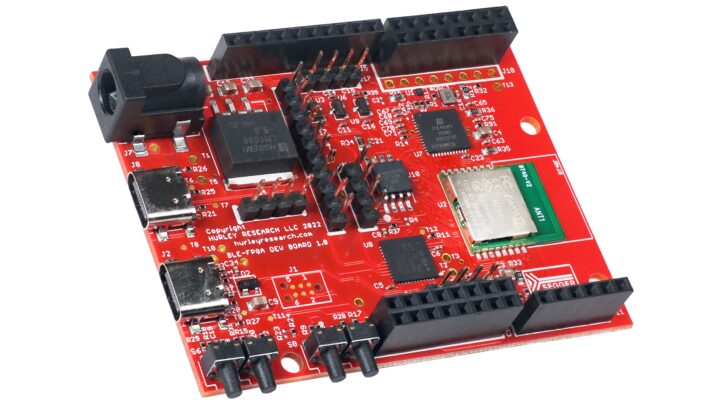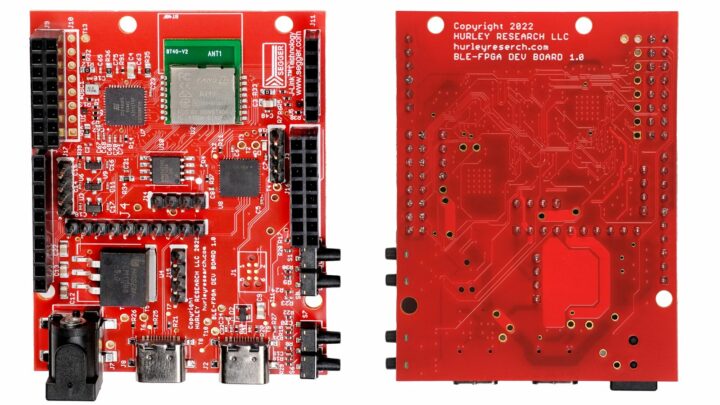The NRFICE FPGA is a Bluetooth FPGA board designed for edge computing and IoT applications. It is built upon a combination of the dual-core nRF5340 Bluetooth SoC and the Lattice ICE40UP5K FPGA.
The ICE40 UltraPlus is a low-power, high-performance FPGA for edge computing and artificial intelligence projects and the nRF5340 is a Bluetooth 5.3 SoC that supports Bluetooth Low Energy (BLE), Bluetooth Mesh, Thread, NFC, and Zigbee.
Through the Nordic nRF5340, NRFICE can load a project directly into the iCE40 FPGA, bypassing the usual extensive toolchain setup. This enables a new class of FPGA development, where bitstreams can be hosted in the cloud, selected by a user on their phone, and loaded wirelessly to the board.
It features a built-in J-Link OB for easy debugging and programming without the need for emulator dongles and is similar to the previously covered Segger emPower evaluation board in this regard. This board supports Arduino Uno 3.3V shields and has a 5V power supply onboard (9V – 12V from wall-wart input), enabling it to supply enough power to shields and daughterboards for LED lighting, motor control, etc.
The project is focused on helping students and developers build experience and industry-transferrable skills with a cost-effective FPGA family. This contrasts with other hobby development platforms such as Arduino and Raspberry Pi where gained skills do not necessarily translate to industrial environments.
NRFICE specifications:
- Microcontroller – Nordic Semiconductor nRF5340, dual-core Bluetooth 5.3 SoC, 128MHz Cortex-M33 with 1MB Flash and 512KB RAM
- FPGA – Lattice Semi ICE40UP5K with 5280 LUTs, 1024KB single-port RAM, 120KB embedded block ram
- Network:
- Bluetooth Low Energy
- Bluetooth 5.3
- LE Audio
- Direction Finding
- 2 Mbps, Advertising Extensions, and Long Range
- Bluetooth mesh
- Thread, Zigbee and 802.15.4
- Bluetooth Low Energy
- Buttons – Reset for each of ICE40 and nRF, and a user-programmable button for each
- LEDs – 2x RGB LEDs, one each for nRF and ICE40
- USB:
- USB-C for J-Link OB
- USB-C for nRF5340, providing VCOM serial port, and other USB implementations per code
- Power Supply:
- 9V – 12V via barrel power connector
- 5V @ 3A regulator
- Form Factor – Arduino Uno compatible form factor and 0.1” pinout
NRFICE is an open-source project and has been certified by the Open Source Hardware Association (OSHWA). Bill of materials, schematics, Gerber files, sample Verilog (FPGA) projects, and other files can be found in the project’s GitHub repository. It works with an open-source Android app that can be used to wirelessly program and configure the nRF5340 chip and the ICE40 FPGA. Also, professional development tools such as Segger Embedded Studio and Lattice’s Radiant are available and can be used with the NRFICE for free.
The NRFICE FPGA board is priced at $159, with free shipping within the US and a $12 shipping fee to the rest of the world. The campaign has already reached its $1,600 funding goal on Crowd Supply. Orders for the board are expected to ship by August 2, 2024.

Tomisin is a writer specializing in hardware product reviews, comparisons, and explainers. He is very passionate about small form factor and single-board computers.
Support CNX Software! Donate via cryptocurrencies, become a Patron on Patreon, or purchase goods on Amazon or Aliexpress






